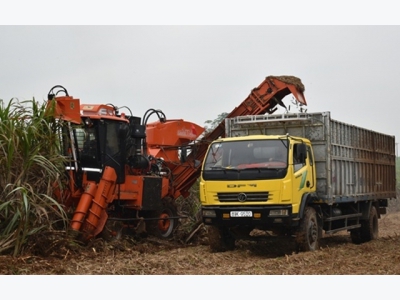Measures to improve investment and business environment in agriculture

Implementing the Government’s Decree No.123/2018/ND-CP on amending and supplementing a number of decrees regulating the investment and business conditions in agriculture, the sector has set out drastic and positive solutions to simplify its administrative procedures.
Harvesting sugar-cane by Shaktiman machine (Photo: NDO/Van Luong)
In 2018, the Ministry of Agriculture and Rural Development (MoARD) cut 173/345 business conditions, accounting for 50%, as well as reducing and simplifying goods subject to specialised inspection from 7,698 lines to 1,768 lines, accounting for over 77%.
This is a huge step forward in the field of agriculture and rural areas because, in 2016-2017, agriculture was well-known as one of the industries with many overlapping and inadequate procedures, causing difficulties for producers and business establishments. For example, chicken eggs from localities surrounding Hanoi were priced VND20,000 per dozen at thee breeding facilities, however, consumers had to buy them at double the price due to too many fee charges. Regarding pork products, at one time, the Ministry of Industry and Trade, the MoARD and the Ministry of Health jointly managed food safety and traceability, but dirty and unidentified meat were sold in the market, causing difficulties for farmers and genuine business establishments.
That situation has been gradually reduced and even prevented. Notably, the reduction and simplification of administrative procedures not only shortens time but also significantly saves costs for both farmers and agricultural enterprises. The cut and simplification of 32 out of 63 administrative procedures for specialised inspection have helped the agricultural sector save over VND400 billion. In the past, the Department for Plant Protection under the MoARD had to annually issue certificates of import and transit of plant products to over 130,000 shipments at the agency, so it took a few days for new enterprises to complete their dossiers. However, since the implementation of the Decision No.2185/QD-TTg on the master plan for implementing the National Single Window and the ASEAN Single Window for 2016-2020, over 85% of their shipments have been checked through the one-stop-shop mechanism, contributing to shortening the time and reducing the transaction costs for enterprises.
In order to effectively reform administrative procedures, the agricultural and rural development sector should make more efforts in addition to the drastic direction of the Government. Officials and civil servants should raise their awareness of the implementation of the reform, while the relevant agencies need to form their legal documents.
It is crucial to ensure the synchronous participation of the ministries and agencies concerned as well as the supervision and criticism of public opinion, the press, people and the business community. The consistency and synchronousness in the simplification of administrative procedures will improve the investment and business environment for agricultural enterprises, contributing to raising the position of the sector and national competitiveness.
Related news
 CPTPP brings opportunities, challenges to Vietnam’s agriculture
CPTPP brings opportunities, challenges to Vietnam’s agriculture The Comprehensive and Progressive Agreement for Trans-Pacific Partnership (CPTPP) has recently taken effect in Vietnam, which will bring about both opportunitie
 Bright prospects in organic tea growing model
Bright prospects in organic tea growing model Yen The is not only famous for hill-grazed chicken but also green tea. In order to improve the quality of this product, in 2018
 EU set to impose tariffs on rice imports from Cambodia, Myanmar
EU set to impose tariffs on rice imports from Cambodia, Myanmar The European Commission (EC) is likely to impose tariffs on rice coming from Cambodia and Myanmar, according to the Italian Association for Agricultural